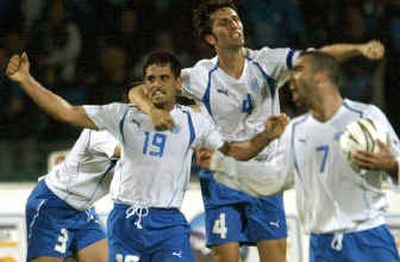Together for once

JERUSALEM — Israel suddenly has two Arab heroes. In a country where Jewish-Arab alienation runs deep, a pair of critical goals in World Cup soccer has created an instant connection across the divide.
For years, Abas Suan and Walid Badir endured racist taunts from the bleachers. Now they’re the toast of the predominantly Jewish state.
Badir scored Israel’s only goal in a 1-1 tie with France on Wednesday in a World Cup qualifying match, repeating Suan’s feat in a Saturday match against Ireland — and keeping Israel in contention for a slot in the prestigious tournament.
The two are among Israel’s minority Arabs, who make up about 20 percent of Israel’s 6.8 million people. Many Israeli Arabs complain they are second-class citizens and targets of discrimination in employment, education and living conditions.
Their rage has spilled over from time to time. Conversely, four years of Palestinian-Israeli violence has kindled Jewish anger against Israeli Arabs for identifying with their relatives in the West Bank and Gaza.
Most Israeli soccer teams have Arab players, and often they are greeted with racist chants. “No Arabs, no terrorism,” goes one.
Now that the two Arab players have rescued Israel’s World Cup hopes, though, there’s a new slogan being carried in banner headlines in Israeli newspapers: “No Arabs, no goals.”
Ahmed Tibi, an Israeli Arab lawmaker, said Arabs have mixed feelings about rooting for Israel in the fervor following the goals by Suan and Badir.
“As Arabs, we’re normally pushed away from the Israeli political issues, and then suddenly we’re pulled into this ultranational patriotism,” Tibi said.
The euphoria and goodwill of the moment may be transitory, said Zouheir Bahloul, an Israeli Arab sportscaster for Israel Radio and TV.
Part of the problem is how Israel’s Arab citizens fit into the nation, dominated by its Jewish majority.
Bahloul said when Israeli Arabs see the athletic accomplishments of Suan and Badir, they feel more a part of Israel. But sports create a virtual reality, he said, generating successful examples for Arabs while doors continue to close in other areas.
“If the state can create more opportunities in other fields, this type of inspiration gives Arabs the confidence to make things happen for themselves,” Bahloul said.
Badir, a tall, rangy defender, burst into the penalty area Wednesday and headed a shot past French goaltender Fabien Barthez, salvaging a tie score.
Badir’s first comments were about his sport. “You have to give 200 percent in your job. I’m doing my best to fulfill my dream of reaching the World Cup,” he said.
But his family’s history in Israel is tainted by conflict and tragedy. His grandfather was one of about 50 Arabs killed by Israeli border police in 1956 at the Arab town of Kafr Kassem in an incident described by Jewish Israelis as a terrible mishap and by Arabs as a massacre.
Yet Badir stands at attention with the rest of the Israeli national soccer team as the Israeli anthem is sung before games, with its lyrics about Jews returning to their ancient land. It makes him uncomfortable, he said.
At a conference on racism in soccer last year, Badir said he hoped that one day the anthem would incorporate something that represents him as an Arab Israeli.
“Then I’ll be able to sing it as well,” he said.
As for Suan, he hopes the goodwill endures.
After scoring his goal, he told The Associated Press: “Now Jews and Arabs have something to agree on … I only hope that Israelis will respect Arabs.”
A native of Sakhnin, an Arab town in northern Israel, Suan said that through sports, athletes can set an example by relating to each other through friendship and dialogue.
“I think we get along better than politicians do,” Suan said.